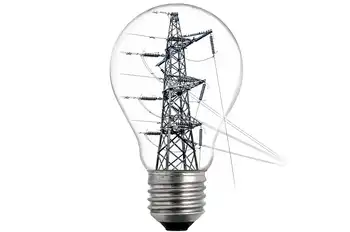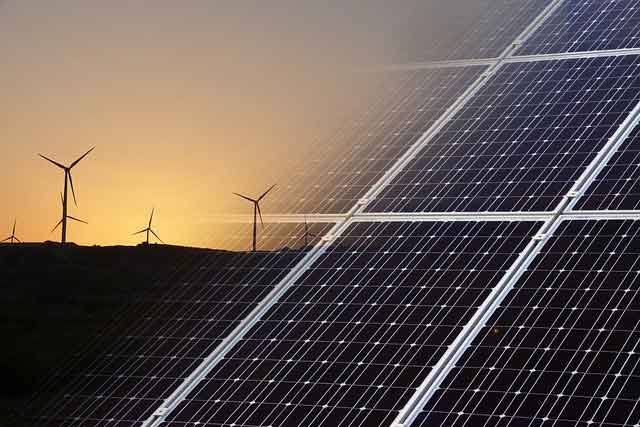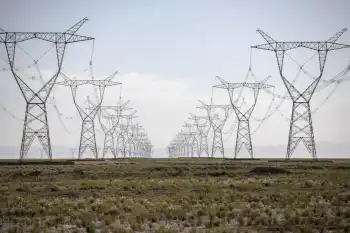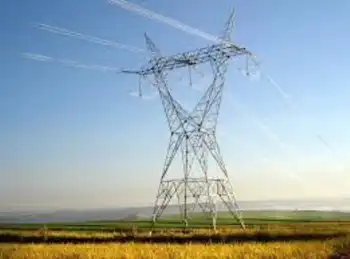States beat Washington to renewable energy
By Reuters
NFPA 70e Training - Arc Flash
Our customized live online or in‑person group training can be delivered to your staff at your location.

- Live Online
- 6 hours Instructor-led
- Group Training Available
It was simply a case of showing that technologies like massive wind turbines and solar roof shingles would do the job with costs that were in line with power generated from fossil fuel, said Jim Marston, of the Texas office of Environmental Defense, an advocacy group.
Texas is one of more than 20 states which, lacking a lead from central government in Washington and spurred by mounting evidence of the threat of global warming, have pressed ahead with their own measures to boost renewable energy use and curb emissions of carbon dioxide, held largely responsible for pushing up world temperatures.
President George W. Bush, having rejected the ground-breaking Kyoto Protocol on curbing carbon dioxide on the ground that the U.S. economy could not afford it, in January acknowledged the challenge of climate change in his State of the Union address and spoke of new technologies and alternative fuels as possible solutions.
Initiatives taken in the United States, the world's largest greenhouse gas polluter accounting for nearly one quarter of all carbon emissions, are watched closely by scientists and governments round the world, hoping Bush's recognition of the need to curb emissions will be followed by meaningful action.
Just days after Bush's address, the Intergovernmental Panel on Climate Change released a report in Paris saying that global warming was "unequivocal" and that human use of fossil fuels almost certainly caused the rise in world temperatures recorded over the last half-century.
The panel forecast further temperature rises in the coming decades that would bring more severe storms, worse droughts and rising seas, threatening coastal areas and possibly forcing millions of people from low-lying land.
The Democratic victory in mid-term congressional elections last year has led to predictions by environmental groups, and some legislators, that the U.S. will set mandatory limits on carbon emissions by the end of this congressional session in 2008.
Some 20 states, refusing to wait for a change of course in Washington, have already taken a variety of steps to tackle climate change, including setting requirements for renewable energy use ranging from 2.2 percent of total electricity generation in Wisconsin to 25 percent in Minnesota.
In Texas, Marston of Environmental Defense said direct action had proved convincing.
"We literally brought in a truck with the wind turbines... then we also showed some of the really interesting cutting-edge technology that's happening in solar, literally having solar panels built into roof shingles," he said in a telephone interview.
That helped convince Texas lawmakers to require that some part of the state's electric power needs be met with alternative energy, he said. To keep the pressure on after the law was passed in 1999, environmental advocates used an age-old spur: competition.
"What we do in Texas is, we talk about keeping up with your neighbors," Marston said. "We were really proud when we passed our law in 1999... within a few years a lot of other states had passed us by, so we caught up to become number one again."
That meant raising the amount of renewable energy required, or what bureaucrats call the 'renewable portfolio standard.'
On the other hand Texas, where Bush has a ranch, remains one of the country's biggest energy users and one company is trying to build 12 more coal-fired plants there, which would dent the state's green credentials.
California, a longtime leader in the drive for renewables, approved a law last September to require cuts in greenhouse gases, while eight eastern states joined in a regional plan to cut emissions of carbon dioxide.
California Gov. Arnold Schwarzenegger and Sen. John McCain of Arizona have called for California's new low-carbon fuel standard, meant to cut the carbon content of transportation fuels by 10 percent by 2020, to be rolled out nationwide.
"We have been working toward this commitment to renewable energy and to the environment for 30 years, and our first global climate change legislation went into effect in 1986," said Claudia Chandler of the California Energy Commission.
Does that mean the states are the place to press the case for alternative energy? Not entirely, according to Chuck Kutscher of the National Renewable Energy Laboratory.
"Climate change is such a big problem, I really do think we need to attack this on several different levels," Kutscher said in a telephone interview from Boulder, Colorado.
Kutscher noted that the use of renewable energy, including biofuels and geothermal power, was only part of the solution.
Data in a report he edited, "Tackling Climate Change in the U.S.", showed energy efficiency would offset more carbon emissions than all available renewable energies combined.
"We don't have to convince everybody," Kutscher said. "People who are passionate about this can influence policy. I think the new Congress is reacting to the segment of the population that is really demanding action."











